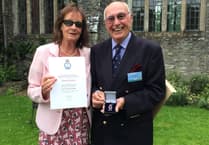A Teignmouth woman living with HIV has revealed the discriminatory remarks she receives - from medical professionals.
Becky Mitchell MBE, 50, was diagnosed with HIV in August 2012, after a year-long relationship with a man who had the virus.
Since her diagnosis, Becky - whose viral load is undetectable - said she has faced discrimination at the hands of doctors, nurses and dentists.
She was getting a flu jab when the nurse giving her the jab shouted: ‘Put gloves on, she's HIV.’
Her dentist also told his assistant to ‘wash her hands’ - even though she'd worn gloves.
Becky, who was awarded an MBE five years ago for services to HIV awareness, said the comments she faced were confusing and unhelpful, and she is speaking out so more women feel safe to tell their story.
The personal trainer and executive assistant added: ‘It was confusing. They were supposed to know better and I knew more than they did. I look after myself, I go to doctors' appointments, I am no risk to anyone.’
‘Women are still under-represented, I know a lot of women who didn't tell their families because they were afraid of discrimination or violence. I thought, if I can help to give them a voice, and try to raise the profile, I am happy to speak out about my experience.’
Becky first faced discrimination for living with HIV in March 2014 after crashing while riding her bike. Her leg was damaged, so Becky went to the hospital to get some stitches.
At a follow-up appointment a week later, a doctor asked Becky if she was an intravenous drug user and questioned her on how she contracted HIV, which she thought was inappropriate.
He then told a nurse who was looking after Becky to take ‘extra precautions’ because she was HIV positive.
‘This nurse had worked on a ward that had looked after HIV patients in the late 80s and early 90s, so she knew that this was not appropriate. She encouraged me to write in and complain, which I did – and got an apology from the doctor.
‘She said we have a universal approach to hygiene, and he said he made a discriminatory comment.’
In a report published earlier this month, The National Aids Trust highlights the discrimination that people living with HIV face. The report, entitled ‘Equality in Name Only?’ revealed that 23% of NHS staff mistakenly believe that HIV can be passed on by spitting, and 5% by sharing cups or cutlery. And 43% of staff expressed a lack of confidence in their knowledge and awareness of HIV.
‘I have a thick skin and can stand up for myself, but there are people who don't feel like that,’ Becky said. ‘That will make people unafraid to go see health care professionals. Comments like that can be damaging.’
Becky said HIV has changed her life but not limited her and is determined to raise more awareness for women living with HIV.
‘I think I have overcome a lot. I wanted to show that you can get on with your life, and have a good, fulfilling life. I have never let it hold me back.’





Comments
This article has no comments yet. Be the first to leave a comment.